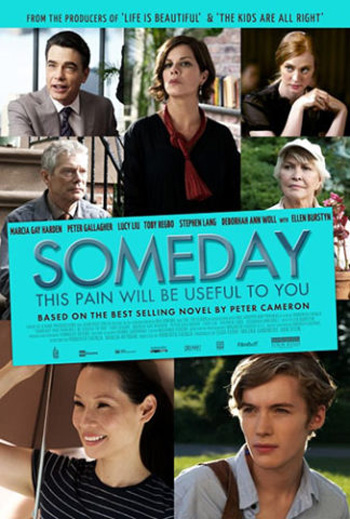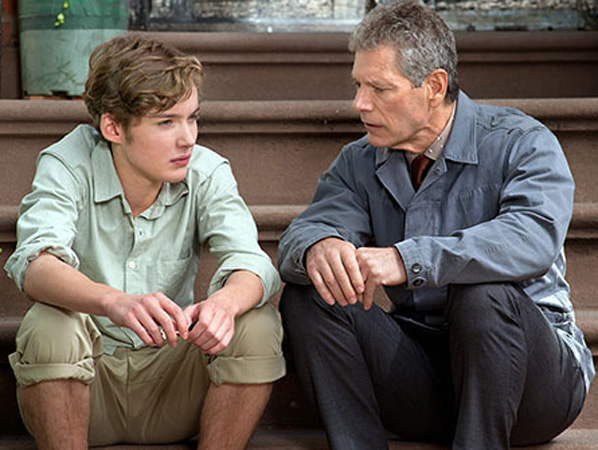 Someday This Pain Will Be Useful to You
Someday This Pain Will Be Useful to You
Directed by Roberto Faenza
Written by Peter Cameron, Roberto Faenza, and Dahlia Heyman
Released November 2, 2011 at the Rome Film Festival
Drama
95 min.
Review by Stephen O. Murray
August 17, 2013.
I’m a big fan of fiction writer Peter Cameron. I didn’t think the 1999 screen adaptation of his novel The Weekend worked very well, but liked the 2009 one of The City of Your Final Destination, that was the final Merchant Ivory-Prawer Jhabvala collaboration.
Like the novel, the point of view of the 2011 movie based on Cameron’s best-selling 2007 novel Someday This Pain Will Be Useful to You; is that of James Sveck (Toby Regbo [Mr. Nobody]), who has just graduated from high school, is working in a Manhattan gallery owned by his mother, Marjorie Dunfour (a somewhat brittle Marcia Gay Harden). His father (the typically reptilian Peter Gallagher) had traded his mother in for a newer model and has some plastic surgery work done, thinking that it will keep his new playmate from thinking about their differences in age. James’s older sister Gillian has her own problems (dating a Polish-born professor of hers). The only member of the family with whom the shy (borderline autistic?) James has rapport is his (I presume maternal) grandmother Nanette (almost as delightful if much less flamboyantly dressed than she is in Political Animals).
 At the gallery he is pretty much the gofer of gay African American John (Gilbert Owuor). John left some trolling for sex online page open on his computer, and James thinks it will be amusing to flirt with him online. Let’s say that when John finds out who his new online admirer is, he is not amused. Nor is Mom, who fires him. Fortunately, he has a “life coach” (Lucy Liu) who takes him running.
At the gallery he is pretty much the gofer of gay African American John (Gilbert Owuor). John left some trolling for sex online page open on his computer, and James thinks it will be amusing to flirt with him online. Let’s say that when John finds out who his new online admirer is, he is not amused. Nor is Mom, who fires him. Fortunately, he has a “life coach” (Lucy Liu) who takes him running.
Though I have some qualms about the jump cuts from scene to scene in the movie, I feel that the sense of James’s alienation survives the transition from page to screen (director Robert Faenza [The Soul Keeper, Alla Luce del Sole] adapted the novel with Dahlia Heyman). Cinema being a more objective medium, doubts in reading about James’s frustrations with others (not just his family, but his room-mates in a DC gathering in which he freaked out) are dispelled by seeing these people (characters). His parents’ and sister’s amours look as pathetic to me as to him.
I don’t recall his mother asking James if he is gay. His father does. The answer is that he doesn’t know, having had no sexual relationships (or nonsexual friendships, for that matter; his online flirtation with John does not seem to be an attempt to hookup, which is why John is involved). He does not even seem curious about what sex would be like with a woman or with another man.
 One unfortunate and to me inexplicable change from the book is that instead of thinking about buying a house in rural Kansas, in the movie the house is in suburban Cleveland. James wants to read, but not be surrounded by young people. (Also, Kansas is the state from which the protagonist of Cameron’s The City of Your Final Destination leaves to go to Uruguay.) Yes, he has considerable material privilege (as does the more clearly autistic teenage Chinese-American boy in Quentin Lee’s White Frog). I’m not convinced the psychic pain James (or Nick) feels will be useful in the future, though I guess character-building (in the prescriptive sense of “character”) likely will be.
One unfortunate and to me inexplicable change from the book is that instead of thinking about buying a house in rural Kansas, in the movie the house is in suburban Cleveland. James wants to read, but not be surrounded by young people. (Also, Kansas is the state from which the protagonist of Cameron’s The City of Your Final Destination leaves to go to Uruguay.) Yes, he has considerable material privilege (as does the more clearly autistic teenage Chinese-American boy in Quentin Lee’s White Frog). I’m not convinced the psychic pain James (or Nick) feels will be useful in the future, though I guess character-building (in the prescriptive sense of “character”) likely will be.
The garbage can art (in book and movie) is rather heavy-handed satire of art being what art galleries choose to display, and the music is very overly insistent, but Regbo, supported by Burstyn and Liu (and an amusing Aubry Plaza as a realtor), carry the movie.
Published by epinions, 17 August 2013
©2013, 2016, Stephen O. Murray

